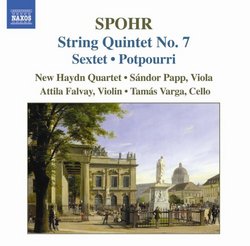| All Artists: Louis Spohr Title: Spohr: String Quintet No. 7; Sextet; Potpourri Members Wishing: 0 Total Copies: 0 Label: Naxos Original Release Date: 1/1/2006 Re-Release Date: 1/17/2006 Genre: Classical Styles: Chamber Music, Historical Periods, Classical (c.1770-1830) Number of Discs: 1 SwapaCD Credits: 1 UPC: 747313596829 |
Search - Louis Spohr :: Spohr: String Quintet No. 7; Sextet; Potpourri
 | Louis Spohr Spohr: String Quintet No. 7; Sextet; Potpourri Genre: Classical
|
Larger Image |
CD Details |
CD ReviewsMostly Very Pleasant Spohr Chamber Music J Scott Morrison | Middlebury VT, USA | 05/28/2006 (4 out of 5 stars) "This CD originally appeared in the late 1990s on the Marco Polo label and may still be available. But it has now been moved over to the mid-price Naxos label -- with its price increase in the past year or so, Naxos can no longer legitimately be called a budget label when there is competition from the likes of Arte Nova and Brilliant Classics -- and it concludes the New Haydn Quartet's traversal of all seven of his string quintets. Quintet No. 7 has been my least favorite of the group at least partly because it is the most 'serious' of the litter; but I now understand why that might be. It was written in 1850 after the heady expectations of the 1848 revolution had not led to the kinds of German democracy and national unity fervently expected by Spohr and most other Germans. (Indeed, the Sextet, also on this disc, is a much happier creation, moodwise, and that is at least partly because it was written in those halcyon revolutionary days of 1848.) This is not to say that the G Minor Quintet is poorly written. In fact, it is one of the more ambitious of Spohr's efforts in that line. But its first two movements have a heaviness about them that I've never quite come to grips with. However, things liven up in the Minuet even if much of it is in a minor key like the rest of the quintet. The sun comes out in the last movement.
The Sextet is altogether a happier matter. First of all, there is the fuller texture of the sextet form -- admittedly it can become clotted in inexpert hands, but Spohr is easily able to keep things fairly transparent -- and the foreshadowing of Brahms's two glorious sextets. Indeed, it is known that Brahms was familiar with Spohr's Sextet and admired it. The thematic material in all four movements is excellent; it easily takes up residence in the listener's musical memory. I hear the Larghetto as a hymn of thanksgiving, unfortunately a bit premature given the turn of events in the German revolution. The Scherzo and Finale, played without pause, are joyous. For lagniappe in this recording of the last of Spohr's quintets we get the lightweight (and early, Op. 22) 'Potpourri' for solo violin and string quartet -- a string quintet sounding much like the 'quatuors brillants' soon to dominate European chamber music -- based on a Russian folk tune and on 'Là ci darem la mano' from Mozart's Don Giovanni. Each tune is treated to a number of variations. The performances are expert. Sound is a little on the thin side but is entirely acceptable. Scott Morrison" |

 Track Listings (8) - Disc #1
Track Listings (8) - Disc #1